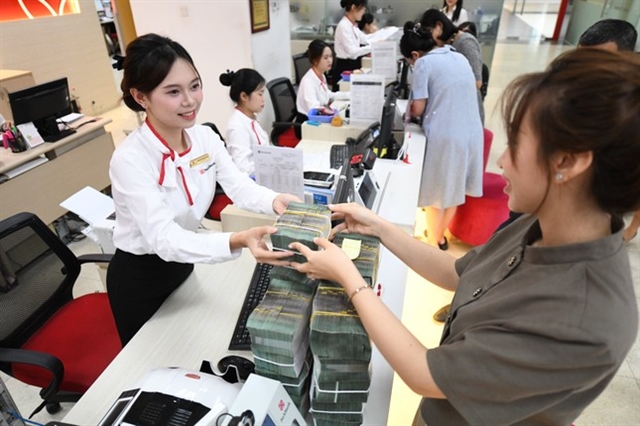The Law on Credit Institutions is proposed to be amended to include some provisions of Resolution No 42/2017/QH14 on piloting bank bad debt settlement.

HÀ NỘI — Proposed changes to the Law on Credit Institutions are expected to benefit commercial banks that focus on retail lending thanks to their ability to quickly process small loans, analysts forecast.
The law will be amended to include some provisions of Resolution No 42/2017/QH14 on piloting bank bad debt settlement as proposed by the State Bank of Vietnam (SBV).
According to analysts of the VNDirect Securities Company (VNDirect), banks, which focus on retail lending such as MB, HDBank, VPBank and VIB, will benefit greatly from the policy change.
Besides, under the amended law, banks like Vietcombank and MB that received the compulsory transfer of weak banks, will also benefit in the process of restructuring weak credit institutions, contributing to promoting credit flows back to the market.
Sharing the same view, analysts of the Saigon Securities Incorporation (SSI) also noted that banks with a high proportion of retail loans such as VPBank or VIB would benefit greatly from the law amendment as the quick handling of small loans helps reduce operational burdens while improving profitability.
The new policy would also actively support banks that received the compulsory transfer of weak banks such as Vietcombank and HDBank in restructuring weak credit institutions, contributing to improving asset quality and unblocking capital flows for sustainable credit growth, SSI said.
Meanwhile, analysts of the Yuanta Vietnam Securities Company believe that the legalisation of Resolution 42, combined with the recovery of the real estate market, will create a dual driving force to improve the quality of bank assets, and banks with high bad debt ratios such as VPBank, OCB, VIB, SHB, BIDV or VietinBank will benefit from a more efficient process of seizing and liquidating collateral.
The SBV, on behalf of the Government, submitted a draft law amending and supplementing a number of articles of the Law on Credit Institutions to the National Assembly for approval.
The amendment and supplementation of the Law is aimed to include a number of provisions of Resolution No. 42/2017/QH14 into the law to timely remove institutional bottlenecks and obstacles in handling bad debts, contributing to unblocking capital sources and improving the safety of the credit institution system.
According to the SBV, Resolution No 42/2017/QH14 on piloting bad debt settlement of credit institutions, which was issued in 2017 and expired at the end of 2024, created conditions for credit institutions to effectively manage bad debts, including the collateral assets of real estate projects.
Credit institutions say they are facing difficulties in handling bad debts due to the expiry of Resolution 42 and want the legal corridor for handling bad debt to be completed.
In the context of a sharp increase in bad debt in the first quarter of 2025, the development of a new legal framework based on Resolution 42 is becoming an important driver to improve the asset quality of the banking system.
Experts have highly appreciated the potential of the new legal framework, especially in handling debts related to real estate and reducing financial pressure on the credit system.
The legal change is expected to help reduce the bad debt ratio of the whole banking industry from 4.3 per cent recorded in January 2025 to below 3 per cent in the first year of implementation.
Experience from the 2017-2021 period showed that Resolution 42 effectively supported the handling of debts with mortgaged assets, especially real estate, VNDirect’s analysts estimated. — BIZHUB/VNS
- Tags
- banking





